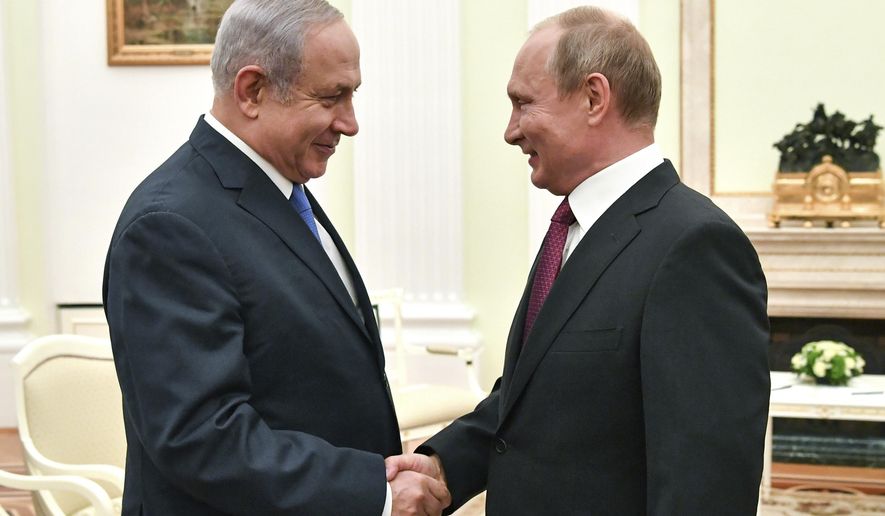OPINION:
Vladimir Putin and Benjamin Netanyahu have had a strong personal relationship for years. And why not? The Russian president and the Israeli prime minister share certain similarities, though the comparison can’t be taken very far.
Both are tough leaders who are not timid in advancing interests, their own and what they perceive to be their countries’ national interests, and they don’t worry overmuch about what the Davos globalists and certain international busybody organizations think. They’re both popular at home.
In the case of Russia, President Putin suppressed the brutal Islamist militancy in Chechnya and reclaimed, with methods no way gentle, Crimea for Ukraine. Mr. Netanyahu’s toughness manifests itself in hard-edged policies toward the terrorist-ridden governments of the Palestinians and the regime in Tehran. He also led the charge against the Iran nuclear deal forged by Barack Obama, the deal that President Trump renounced and withdrew the United States. The heartburn of soft-edged elites over that has not subsided yet.
The two nations’ interests have often aligned as well. Both Russia and Israel have good reasons for suppressing Islamic terrorism. (Doesn’t everybody?) Israel is home for a large Russian emigre community, which ensures the bond between Israel and Russia is culturally if not always politically strong.
But now the two nations are in quite a diplomatic snit, and Israeli-Russian relations are at their lowest state in more than a decade. The troubles began Sept. 17, when a Russian military plane was shot down off the Syrian coast. All 15 Russian soldiers and airmen aboard the plane were killed when their IL-20 surveillance plane crashed into the sea.
The loss of life and plane was a result of friendly (and incompetent) fire. The Syrians shot down by accident a plane of their closest current ally. The Syrian military has no greater friend than Russia. Through thick and thin — even when it looked like he was about to fall, the Kremlin continued to back Bashar Assad in the Syrian civil war. Three years ago the Russians dispatched military troops to make sure he survived. It’s no exaggeration that it’s only thanks to the Russia intervention that Mr. Assad has all but won the civil war.
With Russia’s tacit permission, Israel, too, has intervened in the Syrian war — though at a greater remove. Israel has repeatedly bombed Iran-backed Shiite militant groups with more than 200 air strikes. Israel and Russia have maintained close communications about how to avoid further accidents like the downing of the Russian plane.
But it’s precisely because Israel has been so active in Syria that the plane was shot down in the first place, the Kremlin now says. “Using the Russian jet as a shield, the Israeli pilots put it in the fire of Syrian air defense systems,” Defense Ministry spokesman Major Gen. Igor Konashenkov said. “As a result of the irresponsible actions by the Israeli military, 15 Russian servicemen have died. This is absolutely out of line with the spirit of Russian-Israeli partnership.”
The nub of their complaint is that just before the plane was shot down, four Israeli F-16s carried out an attack on Syrian targets. They gave the Russians only a minute’s warning, and pushed the Russian surveillance plane into harm’s way. The Syrian forces evidently thought they were responding to the Israeli planes when they opened fire on the Russian aircraft. Israel disputes that, and the details remain murky. “We reserve the right to take commensurate measures in response [to the shoot-down],” Gen. Konashenkov said.
Earlier this week, Russia did exactly that. The Putin government announced the transfer of a highly sophisticated air defense system to the Syrian regime, a transfer long opposed by Jerusalem. This is the S-300 ground-to-air missile system, easily hidden and capable of firing a missile up to a target 150 miles distant. “Transferring advanced weapons systems into irresponsible hands will increase the dangers in the region,” the Israelis said.
What would further increase risks is a lasting rift between Russia and Israel. Both countries at present are a needed element of stability in an unstable region. Their co-operation against Islamic terrorism is a good thing, only to be encouraged. The risk of Messrs. Putin and Netanyahu sharing certain personality traits is that when they’re going against each other things can get ugly in a hurry. Neither man is quick to blink. The rift is likely to grow wider before it narrows. The rift demonstrates once more that nations have no permanent friends, but permanent interests.




Please read our comment policy before commenting.